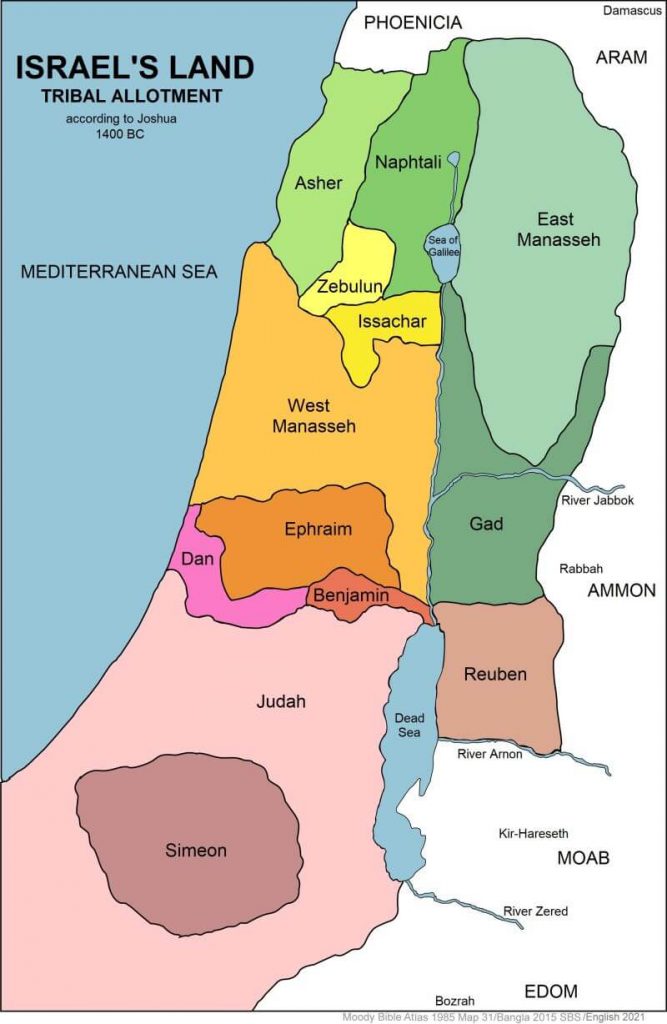GOVERNMENT 09 - Israel's Leadership traced
God establishes elective and representative government Deu 1:9-15
- God establishes an elective and representative government for Israel in 1446-45 BC
- A question can arise: How elective was it really? Was it just one (or a few) strong families within a tribe that put forward the leadership? Was it more feudal or more elective?
- In this study we will trace where Israel’s leadership comes from (as far as details are given).
- The question to ask is: Do the sons of leaders become leaders themselves? Thankfully in Jewish style a leader’s father’s name is mentioned, which really helps in this study:
Head of Ancestral houses in a Military Census in 1445 BC Num 1:5-15
| # | Tribe | Leader | Father | |
| 1 | Reuben | Elizur | son of | Shedeur |
| 2 | Simeon | Shelumiel | son of | Zurishaddai |
| 3 | Judah | Nahshon | son of | Amminadab |
| 4 | Issachar | Nethaniel | son of | Zuar |
| 5 | Zebulun | Eliab | son of | Helon |
| 6 | Ephraim | Elishama | son of | Ammihud |
| 7 | Manasseh | Gamaliel | son of | Pedahzur |
| 8 | Benjamin | Abidan | son of | Gideoni |
| 9 | Dan | Ahiezer | son of | Ammishaddai |
| 10 | Gad | Eliasaph | son of | Deuel |
| 11 | Asher | Pagiel | son of | Ochran |
| 12 | Naphtali | Ahira | son of | Enan |
Leaders of Tribes sent out as Spies in 1445 BC Num 13:4-16
| # | Tribe | Leader | Father | |
| 1 | Reuben | Shammua | son of | Zaccur |
| 2 | Simeon | Shaphar | son of | Hori |
| 3 | Judah | Caleb | son of | Jephunneh |
| 4 | Issachar | Igal | son of | Joseph |
| 5 | Zebulun | Gaddiel | son of | Sodi |
| 6 | Ephraim | Joshua | son of | Nun |
| 7 | Manasseh | Gaddi | son of | Susi |
| 8 | Benjamin | Palti | son of | Raphu |
| 9 | Dan | Amiel | son of | Gemalli |
| 10 | Gad | Geuel | son of | Machi |
| 11 | Asher | Sethur | son of | Michael |
| 12 | Naphtali | Nahbi | son of | Vophsi |
Leaders of Tribes allotting Transjordan 1405 BC Num 34:16-28
| # | Tribe | Leader | Father | |
| 1 | Reuben | |||
| 2 | Simeon | Shemuel | son of | Ammihud |
| 3 | Judah | |||
| 4 | Issachar | Paltiel | son of | Azzan |
| 5 | Zebulun | Eli-zaphan | son of | Parnach |
| 6 | Ephraim | Kemuel | son of | Shiphtan |
| 7 | Manasseh | Hanniel | son of | Ephod |
| 8 | Benjamin | Elidad | son of | Chislon |
| 9 | Dan | Bukki | son of | Jogli |
| 10 | Gad | |||
| 11 | Asher | Ahihud | son of | Shelomi |
| 12 | Naphtali | Pedahel | son of | Ammihud |
- Though these records are all within 40 years, only one name is repeated: Caleb, son of Jephunneh, the faithful spy. He remained alive and still leads his tribe.
- Very important: Not one of the leaders is a son of a leader mentioned earlier. This speaks for tribal leadership skipping between clans and families, not for one strong family holding leadership.

Pass-down of Leadership from Moses to Joshua
- Moses is of the tribe of Levi (Exo 2:1-10, Exo 6:14-25). Joshua is of the tribe of Ephraim (Num 13:8,16).
- At no time is their any mention of Moses’ two sons aspiring to leadership or being given roles of political leadership.
- Joshua grows into leadership by desire & faithfulness and is affirmed by God for leadership (Num 27:18-20, Deu 31:14-15).
Leadership over Israel during the time of the Judges
| Judge | Tribe | Reference | |
| Othniel | tribe of | Judah | Jud 3:9 |
| Ehud | tribe of | Benjamin | Jud 3:15 |
| Shamgar | not mentioned | ||
| Deborah | tribe of | Ephraim | Jud 4:5 |
| Barak | tribe of | Naphtali | Jud 4:6 |
| Gideon | tribe of | Manasseh | Jud 6:11, Jos 17:2 |
| Tola | tribe of | Issachar | Jud 10:1 |
| Jair | tribe of | Gad | Jud 10:3 |
| Jephtah | tribe of | Gad | Jud 11:1 |
| Samson | tribe of | Dan | Jud 13:2 |
- Clearly leadership jumps between the tribes.
- Leadership is quite evenly distributed over all the tribes over time.
- Only the tribes of Reuben, Simeon and Asher are not represented among the judges.
- Only once does the leadership stay within one tribe (Jair of Gad > Jephtah of Gad). About judge Jair not much is known. Also Jephtah’s appointment has nothing to do with Jair (Jdg 11:1-11).
Abimelech attempts to set up a monarchy Jdg 9
- Judge Gideon is wise enough to refrain from establishing a monarchy with himself as King when Israel asks for it: “Rule over us, you and your son and your grandson also; for you have delivered us out of the hand of Midian.” Gideon said to them, “I will not rule over you, and my son will not rule over you; the Lord will rule over you” (Jdg 8:22-23).
- His son Abimelech, however, tries to set himself up as king, killing his many brothers, an attempt which soon fails (Jud 9).
Judge Samuel and his sons 1 Sam 8
- Samuel is a prophet and judge of great integrity (1 Sam 12:3-5).
- Yet when he gets old he makes his sons judges (1 Sam 8:1-2).
- This is without precedent in the history of the judges and promptly becomes problematic: his sons are corrupt (1 Sam 8:3).
- The frustration with this is a factor in Israel wanting a king.
Israel demands a King against God’s will 1 Sam 8

- To demand a King is to demand a monarchy.
- Monarchy will mean the leadership going from father to son (however worthy or unworthy that man may be).
- The question then becomes “which family?”.
Israel’s first king: Saul of the tribe of Benjamin 1 Sam 13:13-14
- God has indicated which family might be a good choice (for now, though no family is a good choice over generations). Saul is confirmed as king.
- God meant to grant Saul and his family a lasting kingship. But when Saul sins repeatedly and doesn’t repent, God withdrawn the leadership from resting on Saul’s family.
Israel’s second king: David of the tribe of Judah 1 Sam 16:1-12, 2 Sam 7:1-17
- God has David anointed to be king by the prophet Samuel.
- After showing much faithfulness and integrity, God confirms David and his family by prophet Nathan as the line for an’eternal kingship’.
Northern Israel’s first king: Jeroboam of the tribe of Ephraim 1 Kin 11:38
- When Rehoboam, grandson of David, son of Solomon doesn’t heed God, God tears 10 tribes (‘Israel’) from him and gives them to Jeroboam (of the tribe of Ephraim), with the promise to give him “an enduring house, as I built for David”.
- Even after the core commitment to David’s house, God seems to feel free to promise leadership to another tribe.
- The promise is – as with David – conditional: “if you walk in my ways”.
- Jeroboam doesn’t and forfeits the enduring leadership of his house.
In Summary
Not surprisingly (because it is neither elective, representative nor merit-based) the monarchy of Israel (and later Israel and Judah) quickly deteriorates.
Firstborn son versus later sons in families
Does leadership automatically go to the first son in the Bible (as is does in many cultures)? Not always:
- Gen 21:12 Not through the first son Ishmael but through the second son Isaac comes the nation of Israel and the messianic line.
- Gen 25:19ff Not through the first son Esau but through the second son Jacob comes the nation of Israel, and the messianic line
- Gen 37-50 Not the earlier sons but the eleventh son Joseph rises to prominence in the family and to high leadership in Egypt.
- Gen 48:8-22 Not the first son Manasseh but the second son Ephraim gets prominence and leadership.
- Not the first son Reuben but the fourth son Judah gets prominence and the messianic line running through him (Mth 1).
- Not Aaron or Miriam but the third child Moses becomes a great leader of Israel (Exo 2).
- 1 Sam 16:1-12 Not the seven older sons but the eighth son David is anointed king and has the messianic line running through him.